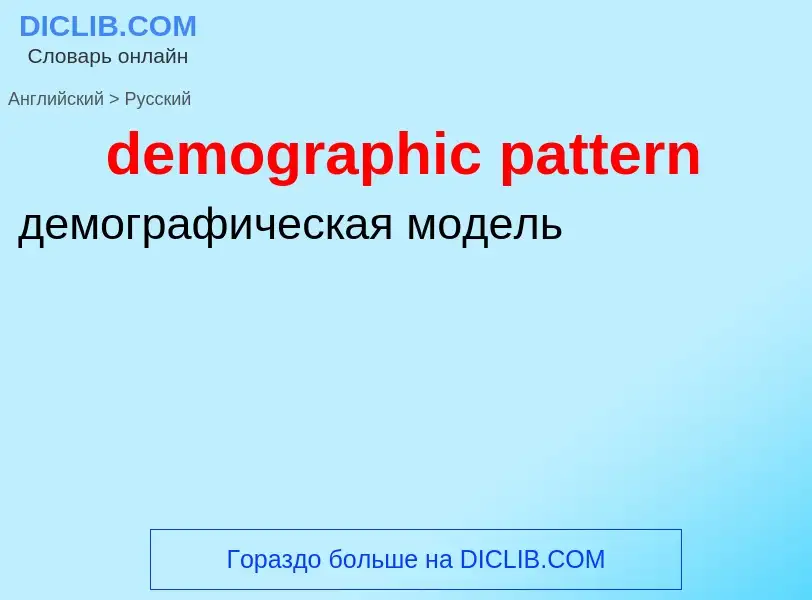Inserisci una parola o una frase in qualsiasi lingua 👆
Lingua:
Traduzione e analisi delle parole tramite l'intelligenza artificiale ChatGPT
In questa pagina puoi ottenere un'analisi dettagliata di una parola o frase, prodotta utilizzando la migliore tecnologia di intelligenza artificiale fino ad oggi:
- come viene usata la parola
- frequenza di utilizzo
- è usato più spesso nel discorso orale o scritto
- opzioni di traduzione delle parole
- esempi di utilizzo (varie frasi con traduzione)
- etimologia
demographic pattern - traduzione in russo
Demographic threat (Israel); Demographic bomb; Demographic time bomb; Demographic timebomb
demographic pattern
демографическая модель
demographic revolution
TRANSITION FROM HIGH BIRTH AND DEATH RATES TO LOWER BIRTH AND DEATH RATES AS A COUNTRY OR REGION DEVELOPS FROM A PRE-INDUSTRIAL TO AN INDUSTRIALIZED ECONOMIC SYSTEM
Demographic transition model; Demographic transition theory; Demographic Transition; Demographic trends; Demographic Transition Model; Demographic shift; Demographic revolution; Population change theory; The demographic transition (DT); The demographic transition; Demographic transition (DT); Contemporary demographic transition
демографическая революция
demographic transition
TRANSITION FROM HIGH BIRTH AND DEATH RATES TO LOWER BIRTH AND DEATH RATES AS A COUNTRY OR REGION DEVELOPS FROM A PRE-INDUSTRIAL TO AN INDUSTRIALIZED ECONOMIC SYSTEM
Demographic transition model; Demographic transition theory; Demographic Transition; Demographic trends; Demographic Transition Model; Demographic shift; Demographic revolution; Population change theory; The demographic transition (DT); The demographic transition; Demographic transition (DT); Contemporary demographic transition
демографический сдвиг; предполагает теоретический подход, объясняющий изменения в размере и структуре народонаселения в период индустриализации.
Definizione
pattern recognition
<artificial intelligence, data processing> A branch of
artificial intelligence concerned with the classification or
description of observations.
Pattern recognition aims to classify data (patterns) based
on either a priori knowledge or on statistical information
extracted from the patterns. The patterns to be classified
are usually groups of measurements or observations, defining
points in an appropriate multidimensional space.
A complete pattern recognition system consists of a sensor
that gathers the observations to be classified or described; a
feature extraction mechanism that computes numeric or
symbolic information from the observations; and a
classification or description scheme that does the actual job
of classifying or describing observations, relying on the
extracted features.
The classification or description scheme is usually based on
the availability of a set of patterns that have already been
classified or described. This set of patterns is termed the
training set and the resulting learning strategy is
characterised as supervised. Learning can also be
unsupervised, in the sense that the system is not given an a
priori labelling of patterns, instead it establishes the
classes itself based on the statistical regularities of the
patterns.
The classification or description scheme usually uses one of
the following approaches: statistical (or {decision
theoretic}), syntactic (or structural), or neural.
Statistical pattern recognition is based on statistical
characterisations of patterns, assuming that the patterns are
generated by a probabilistic system. Structural pattern
recognition is based on the structural interrelationships of
features. Neural pattern recognition employs the neural
computing paradigm that has emerged with neural networks.
(1995-09-22)
Wikipedia
Demographic threat
The concept of demographic threat (or demographic bomb) is a term used in political conversation or demography to refer to population increases from within a minority ethnic or religious group in a given country that is perceived as threatening to the ethnic, racial or religious majority, stability of the country or to the identity of said countries in which it is present in.
Esempi dal corpus di testo per demographic pattern
1. "There is massive movement of people taking place over a period of time, this cannot be allowed to go on," he said, adding illegal migration from across the border has altered the demographic pattern of the region.
2. There, if you and your neighbor lean out your windows, you can hold hands." This demographic pattern is having profound effects on housing construction, commuting and the quality of urban life.

![Demographic change in Germany, Sweden, Chile, Mauritius, China from 1820 to 2010.<br />Pink line: crude [[death rate]] (CDR), green line: (crude) [[birth rate]] (CBR), yellow line: population. Demographic change in Germany, Sweden, Chile, Mauritius, China from 1820 to 2010.<br />Pink line: crude [[death rate]] (CDR), green line: (crude) [[birth rate]] (CBR), yellow line: population.](https://commons.wikimedia.org/wiki/Special:FilePath/Demographic-Transition-5-countries.png?width=200)



